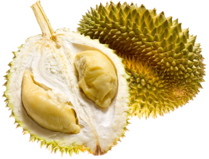Durian

Durian is large spikey fruit with a sulfuric smell. Almost everyone finds this fruit either repulsive or addictive. Few fall in between. Durian is rare in that it is a significant source of carbohydrates, fats, and proteins.
In Thailand, Durian is banned from many public areas because of the smell. Thailand's Ministry of Health warns against eating more than two sections of durian per day, as people have occasionally been known to die from excessive durian intake. People are killed every year by durians falling from trees.
You can find durian at your local Asian market. A typical durian has 5 sections of fruit. When it is ripe, a seam should be visible down the outside of each section of the shell. To eat, pull apart along the shell seams and remove the yellow pod of fruit inside.
| Serving size: | 1 cup |
| Region: | Thailand, Malaysia, the Philippines, Indonesia, and Vietnam |
Health Benefits
| Blood | A strong blood cleanser. |
| Mood | Contains high levels of the amino acid tryptophan, known to alleviate anxiety, depression, and insomnia, and create feelings of euphoria, by raising levels of serotonin in the brain. |
| Muscles | A good muscle builder. Contains high levels of soft proteins. |
| Sexual Function | Asian legends say that durian is a powerful aphrodisiac. |
Nutrients
| Carbohydrates | 65.8 g | 22% | |
| Copper | 0.5 mg | 25% | |
| Fats | 13 g | 20% | A good source of monounsaturated fat |
| Fiber | 9.2 g | 37% | |
| Iron | 1 mg | 7% | |
| Magnesium | 72.9 mg | 18% | |
| Manganese | 0.8 mg | 27% | |
| Potassium | 1060 mg | 30% | |
| Protein/Amino Acids | 3.6 g | 7% | Contains higher levels of protein than most other fruits. |
| Sulfur | N/A | N/A | Known for it's sulfuric odor. |
| Vitamin B6 | 0.8 mg | 44% | |
| Vitamin B9/Folate | 87.5 mcg | 44% | |
| Vitamin C | 47.9 mg | 80% |
